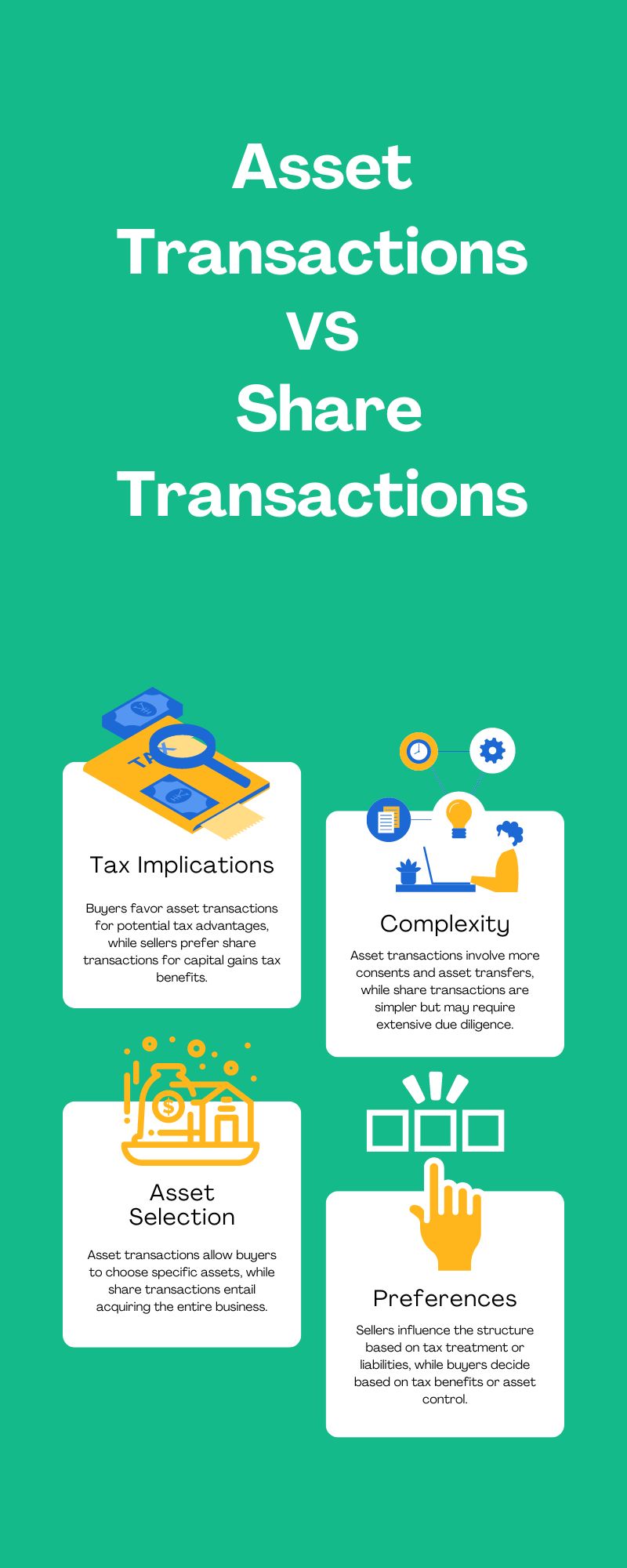As of the second quarter of 2023, the mergers and acquisitions (M&A) in Canada have grown substantially, with the total value of M&A transactions surging to $90.5 billion, a 31% increase from the same quarter last year.
It is a remarkable expansion, indicating a thriving M&A environment. This guide explores the intricacies of M&A activities in Canada, from types of M&As to employment rules.
Types of Mergers and Acquisitions (M&A) in Canada
Primarily, there are two types of M&A in Canada: share purchase transactions and asset purchase transactions. Apart from these, amalgamation, arrangement, and hybrid transaction are other types of M&A:
Share Purchase Transactions
The buyer acquires the issued shares of the target corporation directly from its shareholders in a share purchase transaction. This approach often involves the purchase of a majority or all of the shares.
Asset Purchase Transactions
In an asset purchase transaction, the buyer negotiates to buy the assets of a company, sometimes assuming specific liabilities, without taking ownership of the entity itself. Asset purchases are chosen when focusing on specific property or divisions or when limiting liability exposure is a priority.
Amalgamation
Amalgamation is chosen when the target corporation has many shareholders or option holders. It typically involves merging the acquiring corporation (or a subsidiary) with the target corporation.
Arrangement
Like amalgamation, an arrangement is selected when there are numerous shareholders or option holders in the target. It operates under corporate statutes, allowing various property transfers, article amendments, and share exchanges contingent upon securing shareholder and court approvals.
Hybrid Transaction
A hybrid transaction combines aspects of both share and asset acquisitions. This arrangement ensures that the seller and buyer enjoy specific benefits, such as tax advantages or optimal cash proceeds, depending on their needs and goals.
How to Decide Between Asset Transactions and Share Transactions?
Consider the tax implications, complexity, asset selection, and preferences to decide between asset transactions and share transactions. Take a look at this infographic to understand this better:

Regulatory Approvals
Investment Canada Act and Competition Act
Non-Canadian buyers often establish a Canadian subsidiary for business acquisitions. It protects the buyer from the seller's operations and provides tax benefits. It has the following benefits:
Increasing paid-up capital in a Canadian subsidiary can aid in repatriating funds without Canadian withholding tax.
Strategically raising the tax cost of non-depreciable assets in a Canadian target may offer advantages like foreign subsidiary ownership transfer.
Achieving these benefits may require the post-acquisition amalgamation of the acquisition vehicle and the Canadian target, simplifying interest deduction on acquisition financing against Canadian target income.
Non-Canadian buyers acquiring Canadian business assets are personally responsible for incurred debts, Canadian income tax on assets, and business operations and must annually file income tax returns for Canadian operations.
The Canadian subsidiary acquires assets, conducts operations, reports income, and pays taxes, relieving the non-Canadian parent of these responsibilities.
Employment and Labor Regulations
Responsibilities of the Purchaser Regarding Employees in a Non-Union Workplace
When purchasing shares, the buyer essentially steps into the employer's shoes, leaving all employer obligations within the target corporation. Existing employment terms persist post-closing, with obligations, both to current and former employees, retained by the acquired business.
These responsibilities may be negotiated via indemnity provisions but remain with the target.
On the other hand, asset buyers do not inherit pre-closing obligations unless explicitly assumed in the purchase agreement, except in Québec. Obligations begin anew from the date of re-hiring, with potential mitigation through negotiated indemnity provisions.
However, Québec often entails the assumption of most pre-closing obligations by asset buyers.
Responsibilities of an Asset Buyer Compared to a Share Buyer in a Non-Union Workplace
In an asset acquisition, except in Québec and as stated in the purchase agreement, the buyer can select which employees to retain without matching pre-closing terms, as long as statutory requirements are met. No obligations are owed to employees not offered or not accepting employment with the buyer.
In a share acquisition, the buyer assumes all employees, existing employment terms, and obligations, with no inherent right to alter employment status or terms except as agreed in the purchase agreement.
Re-employment
Statutorily, buyers are usually required to acknowledge employees' service history in business acquisition, preventing them from ignoring prior experience.
However, exceptions exist, particularly in common law jurisdictions, where a buyer may have more flexibility in disregarding past service history, except in Quebec.
In simple words, imagine buying a house with a garden that has been tended by a gardener for years. As a new owner, you’re expected to recognize and respect the work the gardener has done so far. In certain places, you may have the flexibility to change the garden without caring about past efforts, like the pond in your backyard. It is like a special zone in the garden where you must maintain the existing gardening work.
Federal and provincial levels enforce successor employer provisions, ensuring employment continuity for acquired business employees under statutory law, regardless of whether the business acquisition is structured as a share or asset purchase.
Exceptions may apply, such as a prolonged break in service in Ontario.
For non-statutory purposes, especially in non-unionized settings, breaking the service chain may be possible through written agreements specifying the non-recognition of prior service beyond statutory requirements.
In Quebec, buyers face stricter regulations, as the Civil Code and labor standards legislation generally mandate the recognition of employees' seniority in all circumstances when acquiring assets.
Employment Agreements/Outstanding Claims in an M&A in Canada
Termination and change of control obligations are outlined in employment agreements or hiring letters. It's crucial to have a clear understanding of these obligations. In Canada, these obligations can be more significant than they initially seem due to the "reasonable notice" concept.
So, buyers must carefully do as follows:
- examine termination and severance provisions in employment agreements, compensation plans, and policies, considering enforceability risks
- distinguish between "single trigger" and "double-trigger" change of control provisions
- Ensure that they do not have ongoing legal matters, employee complaints, or government investigations unless resolved through release agreements
Changing Terms of Employment for a Business in Canada
In asset acquisitions, buyers typically have substantial control over post-closing employment terms, except in Québec, usually achieved through pre-hiring agreements. However, share buyers lack automatic rights to alter employment terms post-closing.
In non-unionized settings, changing post-closing employment terms requires proper notification processes or individual negotiations. Disadvantageous changes may lead to a "constructive dismissal" claim from employees, alleging a breach of the employment contract.
Even without objections, some changes may be unenforceable in disputes unless "fresh consideration" (e.g., a bonus or stock option grant) is provided; mere continuation of employment doesn't suffice.
Let’s take a closer look at some real-life examples of M&A in Canada below.
Recent M&As in Canada
Here are a few of the recent mergers and acquisitionshttps://www.matrixventurestudio.com/services/business-acquisition-support in Canada. They position the organizations involved to develop better business solutions further, leveraging the strengths of both organizations.
Rogers Communications Inc. and Shaw Communications Inc.
In April 2023, Rogers Communications Inc., an Ontario-based communications and media company, and Shaw Communications Inc., an Alberta-based telecommunications company, completed their merger.
This merger, initially proposed over two years ago, included the sale of Shaw's Freedom Mobile wireless business to Videotron Ltd. as a strategic move to address anti-competitive concerns.
The deal, valued at approximately CAN$26 billion, was granted final regulatory approval in March 2023 by the Canadian Minister of Innovation, Science, and Industry, François-Philippe Champagne.
The merger entails a series of commitments, including significant investments in network expansion and job creation. Both companies could face substantial fines if they fail to meet these obligations. This development transforms the Shaw family into one of the largest shareholders of Rogers, with key executives slated to join the Rogers board.
Sun Life and Dialogue
Sun Life, a Quebec-based insurance company, completed its acquisition of Dialogue, a Quebec-based virtual healthcare platform. The deal, initially announced in July, marked Sun Life's commitment to expanding its relationship with Dialogue, whose services were introduced to Sun Life's group benefits clients in March 2020 as Lumino Health Virtual Care.
Dialogue will continue its operations as a distinct entity within Sun Life Canada, serving its customers and distribution partners. Sun Life's president, Jacques Goulet, emphasized the positive impact of Dialogue on Canadians' lives and its role in alleviating pressure on the healthcare system.
Mergers and Acquisitions Need Complete Due Diligence
There are many types of M&As in Canada, such as share and asset purchases, amalgamation, arrangement, and hybrid transactions. Some key factors influencing the choice between asset and share transactions are regulatory approvals, tax implications, and employment regulations.
Navigating the Canadian M&A field needs a deep understanding of M&A structures and their associated considerations. With the help of Matrix Venture Studio, you get a suite of information and end-to-end walkthrough about business acquisitions, M&A due diligence, M&A support, legal help and much more.





Leave a reply